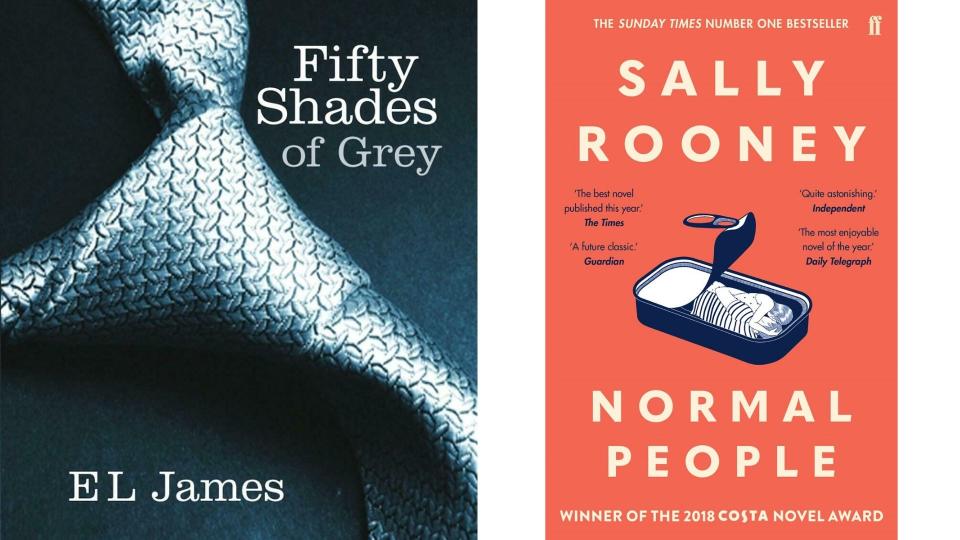Normal People: Bizarre side effect of economic downturns

Where do you go when the world is terrible?
For readers, the answer is simple: another world.
Also read: Normal People: Connell's chain gets Instagram account and sparks surge in sales of men's jewellery
eBay Australia has recorded an increase in both fiction and non-fiction book sales since the self-isolation period began with Australians spending $9 million on books.
And erotica is leading the charge, with sales up 423 per cent.
Australians have been digging into Fifty Shades of Grey and Mills & Boon novels on their digital readers, eBay Australia head of communications Sophie Onikul has revealed.
Sally Rooney’s hit romance novel Normal People is also near the top of the charts.
“Books join the list of traditional pursuits such as board games, puzzles, model train sets and paint by numbers that have recently seen a huge spike in sales. And getting lost in a good book is an ideal way to escape and de-stress during isolation,” Onikul said.
“While books are very much back in vogue, it’s also clear we’re a sheepish nation that prefers to purchase erotic fiction online rather than have to face the person behind the counter at the book shop!”
But it’s not just erotica and romance: Australians are also diving into fictional and dystopian realms.
“Science fiction and fantasy are some of eBay’s most popular fiction genres. Since lockdown these categories have continued to soar with both experiencing a spike in sales of 70 per cent in April, compared to this time last year,” Onikul said.
“While lockdown has spurred a resurgence of people reading to keep themselves entertained, the popularity of these genres is likely linked to escapism - and particularly in harder times like now - a case of life imitating art.”
Metro 2033, Brave New World and The Man in the High Castle are among eBay’s best-selling science fiction and fantasy novels.
Dark days prompt fantastical journeys
But it’s not a new trend: previous times of trouble have also coincided with increased book sales and an increased interest in fiction.
In the year following the global financial crisis, Stephenie Meyer’s Twilight series was top of the charts, along with Dan Brown’s adventure-mystery novels. Both authors are known for their fantastical characters and popcorn plots.
“The crash happened in late 2008 and straight after that, there were some big series set in other worlds that people retreated to, or immersed themselves in. That is something fiction can do when there are challenging things going on in the world,”Hachette UK chief executive David Shelley told the Financial Times.
The GFC also saw romance sales outstrip nearly all other categories, The New York Times reported in 2009.
As journalist Motoko Rich wrote, “In a recession, what people want is a happy ending.”
Currently, readers are also turning to sci-fi to reckon with the health crisis, according to the University of Toronto course instructor Katherine Schwetz.
“The social upheaval caused by COVID-19 evokes many popular dystopian or post-apocalyptic books and movies. Unsurprisingly, the Covid-19 crisis has sent many people rushing to fiction about contagious diseases. Books and movies about pandemics have spiked in popularity over the past few weeks,” Schwetz said.
Dark economic days often trigger literary trends: young adult dystopian novels The Hunger Games and Divergent all took off following the Global Financial Crisis, while Mary Shelley wrote Frankenstein at the end of the First Industrial Revolution.
As the World Economic Forum’s head of programming Sebastian Buckup said, that novel captured the “fears and squeamishness of a society going through massive transformations whilst making its first forays into surgery”.
“The book took inspiration from earlier critics of the dawn of industrialisation, among them John Milton and Samuel Taylor Coleridge.”
And during The Depression, vampires were also popular: The Werewolf of Paris was the April 1933 best-seller.
“While there are few works of vampire fiction that explicitly engage with economic trends, vampires reflect, by their very nature, economic inequality, financial despair, and extractive capitalistic practices that lay waste to communities and those within them,” S.E. Smith wrote for Bitch Media in 2019.
“Vampires really excel as a kind of mascot of unchecked capitalism. In his 1867 pamphlet Capital, Karl Marx explicitly referred to capital as “vampire-like,” able to survive only through “sucking living labor” and growing stronger and more powerful with time.”
Aldous Huxley’s dystopian classic Brave New World took off in 1932, but readers also sought out stories of hope: Faith Baldwin’s novel White Collar Girl about a woman whose family fortunes had crashed was also a hit in May 1933.
Then, in 1936, the sweeping historical romance Gone with the Wind became a two-year bestseller. At the time, critics wondered if the book was the end of high-brow literature - critiques that would be altered and echoed with the release of Twilight.
As the quote attributed to Mark Twain goes: “History doesn’t repeat, but it often rhymes.”
In other words? Maybe it’s time to read Normal People.
Follow Yahoo Finance Australia on Facebook, Twitter, Instagram and LinkedIn.

 Yahoo Finance
Yahoo Finance 

